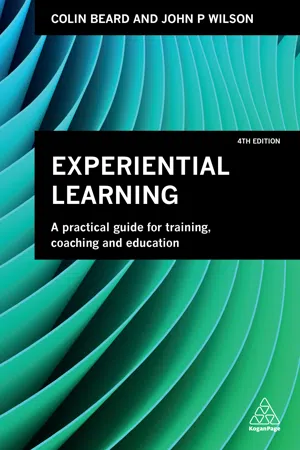
Experiential Learning
A Practical Guide for Training, Coaching and Education
- English
- ePUB (mobile friendly)
- Available on iOS & Android
Experiential Learning
A Practical Guide for Training, Coaching and Education
About this book
In a fast-paced and innovative world, traditional training methods can no longer be relied on to improve performance, engagement or promote behavioural change. Experience-based learning, in which the experience is central to the learning process, is more affordable, appealing and effective than ever before.
Experiential Learning combines in-depth theory with international case studies from companies including KidZania, Shell and the UK National Health Service (NHS) and numerous practical tools for developing and delivering learning experiences in both for-profit and not-for-profit organizations. It presents a simple model, the Learning Combination Lock, which enables trainers, coaches, facilitators and educators to select the best strategies for their circumstances to maximize comprehension, knowledge retention and application. Essential reading for anyone designing and delivering learning experiences, it covers areas such as experiential learning activities, indoor and outdoor learning environments, creative learning, working with the senses and emotions to help promote learning, and reviewing and evaluating initiatives.
In addition to featuring new international case studies and examples, this updated fourth edition of Experiential Learning contains new material on the mechanisms underpinning learning, mindfulness and wellbeing, experience and language and digital games and the design of multi-sensory experiences. Online supporting resources consist of audio files exploring sensory intelligence.
Frequently asked questions
- Essential is ideal for learners and professionals who enjoy exploring a wide range of subjects. Access the Essential Library with 800,000+ trusted titles and best-sellers across business, personal growth, and the humanities. Includes unlimited reading time and Standard Read Aloud voice.
- Complete: Perfect for advanced learners and researchers needing full, unrestricted access. Unlock 1.4M+ books across hundreds of subjects, including academic and specialized titles. The Complete Plan also includes advanced features like Premium Read Aloud and Research Assistant.
Please note we cannot support devices running on iOS 13 and Android 7 or earlier. Learn more about using the app.
Information
PART ONE
Experiential learning: foundations and fundamentals
02
Practical answers to some theoretical questions
Introduction
- Question 1: Experiential education (EE) and experiential learning (EL) – are they virtually the same?
- Question 2: Is experiential learning (EL) simply the sum of an experience (E) plus an intention to learn (L)?
- Question 3: What are the more popular models currently being used to explain experiential learning?
- Question 4: What are the main criticisms of experiential learning?
- Question 5: Has the notion of the experience society contributed to our understanding of experiential learning?
Question 1: Experiential education and experiential learning – are they virtually the same?
- A: The combination of processes throughout a lifetime whereby the whole person – body (genetic, physical and biological) and mind (knowledge, skills, attitudes, values, emotions, beliefs and senses) – experiences social situations, the perceived content of which is then transformed cognitively, emotively or practically (or through any combination) and integrated into the individual person’s biography, resulting in a continually changing (or more experienced) person.
- B: A holistic philosophy, where carefully chosen experiences supported by reflection, critical analysis and synthesis are structured to require the learner to take initiative, make decisions and be accountable for the results, through actively posing questions, investigating, experimenting, being curious, solving problems, assuming responsibility, being creative, constructing meaning and integrating previously developed knowledge.
- C: A sense-making process involving significant experiences that, to varying degrees, act as the source of learning. These experiences actively immerse and reflectively engage the inner world of the learner, as a whole being (including physical-bodily, intellectually, emotionally, psychologically and spiritually) with their intricate ‘outer world’ of the learning environment (including belonging and acting (conative) in places, spaces, within the social, cultural and political milieu) to create memorable, rich and effective experiences for, and of, learning.
The foundations of experiential learning
Boundary disputes
Question 2: Is experiential learning (EL) simply the sum of experience (E) plus learning (L...
Table of contents
- Cover
- Title Page
- Copyright
- Contents
- List of Figures
- List of Tables
- 01 A brief introduction to experiential learning
- PART ONE Experiential learning: foundations and fundamentals
- PART TWO The Learning Combination Lock model
- PART THREE Experiential learning and the future
- References
- Index
- Backcover